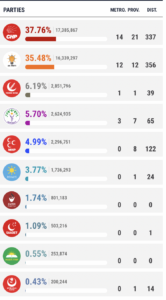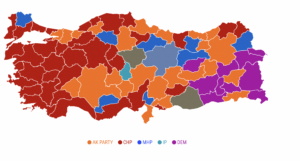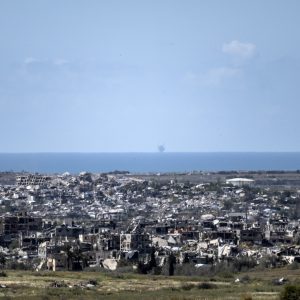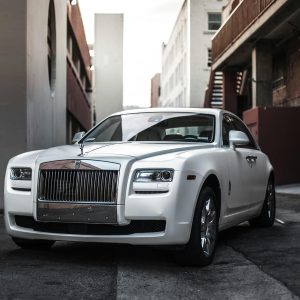Türkiye votes for transformation in pivotal local elections
This election also witnessed the emergence of new Islamic political forces, the Yeniden Refah Partisi (New Welfare Party), which managed to carve out its niche in political landscape
By Iftikhar Gilani
Under the gentle embrace of a vernal sun in Ankara on Sunday, a narrative of political metamorphosis unfolded.
Murat Oktay, once a linchpin in the foundation of President Recep Tayyip Erdogan’s Justice and Development Party (AK Party), found himself at a crossroads of conscience and country. The retired government official, whose loyalty to Erdogan’s vision had been unwavering since 2001, cast a vote that would resonate far beyond the confines of the polling booth. It was a gesture of defiance against the economic turmoil that had ensnared his homeland, signaling a broader wave of dissent that threatened to unravel Erdogan’s longstanding dominion over Turkish politics.
The tremors of change were palpable across the nation as voters, in an unprecedented rebuke, pivoted towards the secular bastions of the Republican People’s Party (CHP), wresting control from the AK Party’s grasp. The local elections, often overshadowed on the global stage, are a litmus test for the national mood in Türkiye—a country without the buffer of state governments to dilute the central power’s influence.
The results were startling: the CHP’s ascendancy in 14 metropolitan cities, 21 provinces, and 337 district councils not only marked a seismic shift but also spotlighted the urban-rural dichotomy that had long colored Turkish political discourse.

The CHP also secured 37.49% votes against ruling AK Party’s 35.49% votes. Although contesting in an alliance last year against Erdogan in the presidential polls, it could not cross the 25% vote mark. Experts say a 12% jump in its votes in a year despite multiple dissensions and breaking of alliances is clearly a remarkable achievement for the party, which founded by modern Türkiye’s founder Mustafa Kemal Ata Turk had gone into oblivion over past four decades.
In Istanbul, the re-election of Mayor Ekrem Imamoğlu not only fortified his position as a formidable adversary to Erdogan but also emblemized a broader call for change that transcended local politics. Imamoğlu’s victory, emblematic of Istanbul’s strategic and symbolic significance, hinted at burgeoning national aspirations and challenging Erdogan.
Analysts say, the electoral upset illuminated the public’s growing disquiet over economic instability, with inflation and financial woes at the forefront of the electorate’s grievances. Many also complained insufficient response of Türkiye to Israel’s actions on Gaza.
Erdogan concedes defeat
Conceding defeat of his party, Erdoğan stated that the nation exhibited its will in the ballots, without encountering any restraints and that it was a major gain for Turkish democracy.
“The victor of this election is democracy, the nation’s will, regardless of political views of the electorate,” he said.
He also admitted that they could not achieve the desired result, especially nine months after the general and legislative elections, in which the AK Party emerged winner.
“We worked intensely for the election. AK Party staff worked day and night, in harmony, with self-sacrifice,” said Erdoğan, who himself toured 52 cities on the campaign trail over the past two months.
The loss of key cities and regions, once considered unshakeable bastions of AK Party support, underscored a broader disenchantment among the electorate, particularly concerning economic policies and concentration of power. The economic strife, characterized by persistent inflation and financial instability, emerged as a central theme in the electoral discourse.
In the run up to the elections, while Erdogan raised minimum income and salaries or employees to address inflation woes, he left out pensioners from the list.
“It had a big impact. There are some 15 million pensioners in the country. They all teamed up along with first time and young voters and shifted loyalties to teach Erdogan a lesson,” Mehmet Ozturk, a political commentator told the MNTV.

New Political Force
This election also witnessed the emergence of new political forces, the Yeniden Refah Partisi (New Welfare Party), which managed to carve out its niche in the political landscape. The Islamist party led by Ali Fatih Erbakan, son of Erdogan’s mentor and former Prime Minister Necmettin Erbakan emerged as third largest political force securing 6.19% votes and taking control of one metropolitan city and two province and 69 districts. In some cities the party got 20-25% votes as well. In the 2023 presidential polls, this party had sided with Erdogan, but soon broke away.
A beaming Erbakan said, his party is the undisputed winner and star of the March 31 elections.
“In addition to Şanlıurfa and Yozgat, we won 43 district and 24 town municipalities in the local elections.” Erbakan said,
He said in a year his party has secured 100% increase in votes in the mayoral elections and over 150%in municipal council votes. He said mayors of his party will serve with the consciousness and will prove an example for the whole country.
The party’s performance indicates a emergence of a new Islamist party, a development that could have lasting implications for Türkiye’s political spectrum. The conventional Islamist Saadat Party fared poorly in the elections along with two other ultra-nationalist parties MHP and Good Party.

Analysts say, the election’s outcome delineates more than a mere partisan victory; it serves as an implicit referendum on the administration’s policies. It is also a clarion call for reformation, an embodiment of the public’s aspiration for accountability, transparency, and respect for democratic norms.
The geopolitical implications of these elections are also significant. Erdogan’s foreign policy, particularly his stance on Israel and the conflict in Gaza, came under scrutiny, reflecting the electorate’s expectation for a more assertive Turkish position on the international stage.
Many voters were expressing resentment at Erdogan not doing enough to act against Israel. Although Erdogan did organize public meetings and spoke against Israeli bombardment, but many on the streets were demanding an end to diplomatic relations and commercial ties with Israel.
In this evolving tapestry of Turkish politics, the story of Murat Oktay and millions like him is emblematic of a broader awakening—a quest for a Türkiye that reconciles its rich historical legacy with the imperatives of modern governance. As the nation embarks on this journey of renewal, the road ahead promises a landscape of challenges and opportunities, with the electorate poised to shape the contours of its political destiny.











